The 6th Congress opened a new period. On the basis of loyalty to Marxism-Leninism, the Party flexibly applied it to carry out the renovation process.
The break away from dogmatism has helped our country escape poverty, the country's economy is increasingly improving. After nearly 40 years of renovation, besides the great achievements, we see somewhere the new disease of dogmatism appearing, greatly affecting the country's development.
Identifying new manifestations of dogmatism
Dogmatism is the principles, viewpoints, and principles that people blindly accept, without proof, without criticism, without paying attention to the conditions of its application. Dogmatism also refers to the thought and action of absolutizing theory, disregarding and belittling practice, or applying theory without taking into account practice. It can be divided into two forms: Theoretical dogmatism: Applying theory without basing on specific practical conditions, applying without understanding the nature of theory. Experiential dogmatism: Applying the experience of other industries, other people, other localities, other countries into practice mechanically, without taking into account specific practical conditions. Dogmatism can be understood as the state of dogmatic perception and action in both theory and practice that lasts for a long time in a group of cadres and party members, which needs to be recognized and overcome. The new dogmatism in a group of cadres and party members has many manifestations, but in general, it can be summarized on the following issues:
Dogmatizing resolutions: At each stage, the nature of tasks is different, so resolutions must have different policies and solutions for implementation. However, at present, in leadership activities, especially in resolution-making activities, some Party committees and secretaries still have the perception that the tasks of agencies and units are "spring and autumn periods", repeating themselves year after year without anything new. Therefore, in many Party organizations, especially at the grassroots level, leadership resolutions are built according to a template, copied exactly as before, only changing the date and month. At present, in some Party organizations, especially at the cell level, the preparation of drafts and the issuance of resolutions are formal, even to deal with inspection and supervision by higher-level Party organizations. That leads to the situation where resolutions next month, next quarter, next year are the same as before, at most only adding a few contents to make them different from before. This new manifestation is not only theoretical and practical dogma but also shows the lack of responsibility of a number of cadres and party members.
Foreignization of policies: In recent times, among cadres and party members in many ministries, branches and localities, there has been a situation of organizing many survey trips and study tours abroad. The purpose of the trip is clearly positioned as bringing knowledge and experience in organization, management and socio-economic development from other countries, especially advanced countries, to apply in Vietnam. However, many cadres with high positions and influence who study abroad bring back the entire models from abroad and apply them to Vietnam, thinking that it is learning, creating and absorbing new things. This imposition has not considered that our socio-economic conditions and infrastructure conditions are not suitable and cannot fully absorb that experience. The consequence is a great loss and waste of social resources. The BRT bus rapid transit (BRT) road project in the capital Hanoi is a typical example of the new dogma, learning from advanced countries' experiences and bringing them to Vietnam. Due to not being suitable for Vietnam's traffic infrastructure conditions, the above project is at high risk of having to stop operating, wasting a lot of investment resources.

Illustration photo / tuyengiao.vn
Fear of making mistakes leads to repeating old formulas and procedures in new work, regardless of low efficiency: The fear of making mistakes, not daring to think, not daring to do, not daring to take responsibility in a group of cadres and party members leads to the situation of doing the same as the previous person, last month, last year, previous process, previous term without daring to make breakthroughs to ensure their own safety. These cadres and party members only care about keeping themselves safe in a "small cocoon", do not want to innovate, learn, only limit themselves to the mindset of the term, avoid collisions to finally "land safely". This leads to the situation of repeating "formulas" and "old procedures" in new work in leadership and direction. From "keeping their ears shut", not daring to speak out what they think and worry about, they gradually become indifferent to social changes, indifferent to the tasks of the agency, unit and their own responsibilities and duties.
Indecisive attitude: Its manifestation is not expressing one's own opinions in the activities of the Party Committee and Party organization. This disease exists in two forms: The first form, cadres and Party members actually have ideas but because they are afraid of conflict and afraid of expressing themselves, they agree on everything, leading to "yes at fifteen, nodding at fourteen", "high consensus". This is a manifestation of following the flow in leadership. Its consequence is that Party members cower in their own "cocoon", see many problems, have innovative ideas, have initiatives but do not dare to present or express them. The second form is people who are lazy in thinking, lazy in thinking, consider leadership to be the work of the Party Committee, of the Party organization, so they are not proactive in participating in contributing to discussions and building resolutions and other decisions. Both forms give the same answer: not mobilizing collective intelligence and responsibility in leadership decisions.
Unforeseen consequences
The biggest consequence is that if this disease persists, it will be an obstacle that causes stagnation and holds back development. Because the leadership resolution is not really the concretization of the higher-level resolution, and is not a leadership resolution in the new period, but just a resolution that is copied as before. Such a resolution is ineffective, cannot have creative and breakthrough policies and solutions, and is completely lifeless, far from reality, and not close to the requirements of the task. Therefore, the activities of agencies, units, and localities take place in a monotonous, average manner, without breakthroughs, leading to stagnation, regression, and backwardness because the reality of economic and social life is always fluctuating and changing.
The new dogmatism is also an obstacle to putting the resolution into practice. Because in the perception of a part of cadres and party members, they have lost their leadership role. Therefore, in practical activities, it is difficult for them to uphold their responsibility to put the resolution into practice; they will act out of habit, whether it is successful or not. Obviously, such a part of cadres and party members, even at the grassroots level, will be an obstacle that reduces the leadership capacity and governing capacity of the Party. Because what the Party, State, people, agencies and organizations expect from them is their enthusiasm, dedication, intelligence, and creative ideas for the cause of innovation, the cause of building and developing agencies, units and localities, but they do not have them.
The mechanical and dogmatic application of both theory and practice without taking into account socio-economic conditions will waste a large amount of resources of the country, agencies, units and localities, cause public outrage, reduce the prestige of the Party's leadership and the prestige of cadres and Party members. In addition, the new dogmatism is also a fertile ground for authoritarianism, authoritarianism, subjectivity and voluntarism to develop. That also means that mistakes and negative things in leadership work are not fought and eliminated, mistakes follow mistakes. This will lead to unpredictable consequences such as the collective losing its leadership role, the principles of organizing Party activities are neglected, and collective intelligence and responsibility for making leadership and management decisions are not mobilized.
The cure for the new dogma
Based on the clear identification of the manifestations of the new dogmatism, there should be solutions for each cadre, party member, and party organization to effectively overcome the manifestations of this disease. Accordingly, it is necessary to implement well the following solutions:
Firstly, continue to study and summarize practices, supplement and develop the theory of Marxism-Leninism and Ho Chi Minh's thought in the new conditions of the Vietnamese revolution. Up to now, the historical conditions, context, position and strength of our country have changed and developed much more. Therefore, on the basis of taking Marxism-Leninism and Ho Chi Minh's thought as the ideological foundation and compass for all actions, our Party needs to promote the study and summary of practices to clarify, supplement and develop the theory of Marxism-Leninism and Ho Chi Minh's thought in the new context. The results of the summary and lessons learned will be the basis for orienting the planning of the Party's leadership guidelines and policies in line with the requirements and demands of reality. At the same time, it will be the basis for Party organizations and Party members at all levels to study, thoroughly grasp and creatively apply them to the practical activities of their ministries, branches, provinces, cities, agencies and units.
Second, perfecting the mechanism to promote the spirit of "7 dares" among cadres and party members. Promoting the spirit of "7 dares", especially the spirit of daring to do and taking responsibility of cadres in charge and at the top, requires a mechanism to manage, orient and protect cadres. That mechanism must be institutionalized into law, to be both open and open enough for cadres and party members to promote the spirit of "7 dares" to the highest level, but still in accordance with the law so that cadres and party members can avoid problems and violations.
Third, continue to promote the study and practice of Ho Chi Minh's thought on practicality among cadres and party members. His practical style is most deeply expressed in not applying mechanically or dogmatically, but always standing on the ground of Vietnamese revolutionary reality, Vietnamese culture and people to research, protect, develop and apply Marxism-Leninism. Each cadre and party member needs to grasp and deeply understand their duties and responsibilities, go deeply into practice, practice leadership and direction methods closely and specifically, ensuring scientific and effective nature.
Fourth, create a breakthrough in training and fostering associated with challenging training for cadres at all levels of the Party. This is identified as a breakthrough because cadres, in addition to being trained in basic knowledge and fostering leadership and direction skills, also need to undergo challenges and practice in practice. The more and more practical work experience, the more effective and practical the leadership and direction experience of cadres and party members will be, avoiding voluntarism, dogmatism and mechanicalness.
Fifth, promote democracy in policy criticism, especially for leaders at all levels. It is necessary to promote widespread democracy in policy criticism, democracy must be implemented within the party organization, within the agency, and unit. For local leaders, it is also necessary to do a good job of operating the social criticism system to respond to information from the practical implementation of decisions and policies of party committees and local authorities at all levels, thereby helping party committees, secretaries, and leaders have a comprehensive view of the effectiveness of policy implementation, promptly detecting shortcomings for adjustment.
The new dogmatism among a number of cadres and party members is a problem that needs to be identified and oriented to be overcome. The focus is on continuing to promote the study and following of President Ho Chi Minh's ideology and practical style, while perfecting the mechanism to promote the spirit of "7 dares" among cadres and party members, especially leaders. That is a practical way to protect, supplement and develop Marxism-Leninism and Ho Chi Minh's ideology in the new situation, ensuring the role and mission of the Party and each cadre and party member in the practice of leading and directing the construction and protection of the Socialist Republic of Vietnam.
Ta Ngoc (According to qdnd.vn)
Source


![[Photo] General Secretary To Lam, Secretary of the Central Military Commission attends the 12th Party Congress of the Army](https://vphoto.vietnam.vn/thumb/1200x675/vietnam/resource/IMAGE/2025/9/30/9b63aaa37ddb472ead84e3870a8ae825)
![[Photo] Panorama of the cable-stayed bridge, the final bottleneck of the Ben Luc-Long Thanh expressway](https://vphoto.vietnam.vn/thumb/1200x675/vietnam/resource/IMAGE/2025/9/30/391fdf21025541d6b2f092e49a17243f)
![[Photo] The 1st Congress of Phu Tho Provincial Party Committee, term 2025-2030](https://vphoto.vietnam.vn/thumb/1200x675/vietnam/resource/IMAGE/2025/9/30/1507da06216649bba8a1ce6251816820)

![[Photo] President Luong Cuong receives President of the Cuban National Assembly Esteban Lazo Hernandez](https://vphoto.vietnam.vn/thumb/1200x675/vietnam/resource/IMAGE/2025/9/30/4d38932911c24f6ea1936252bd5427fa)
![[Photo] Solemn opening of the 12th Military Party Congress for the 2025-2030 term](https://vphoto.vietnam.vn/thumb/1200x675/vietnam/resource/IMAGE/2025/9/30/2cd383b3130d41a1a4b5ace0d5eb989d)


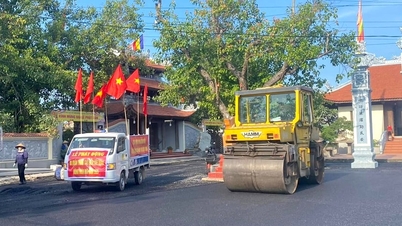


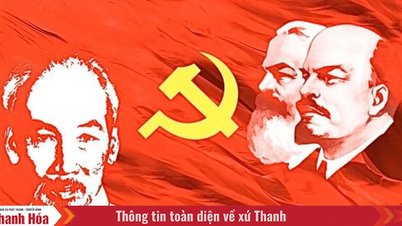
















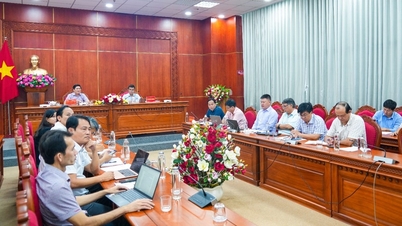

















































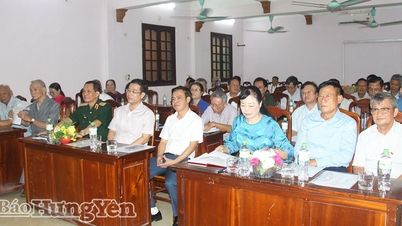
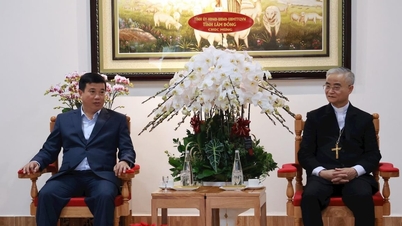



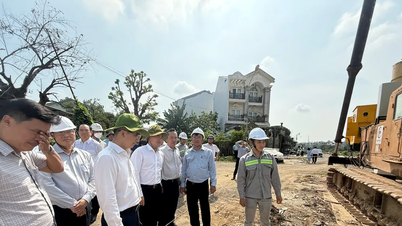
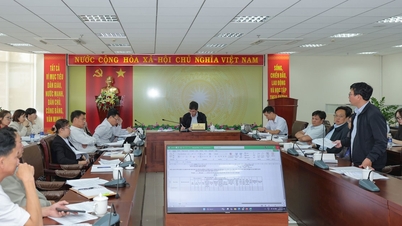














Comment (0)